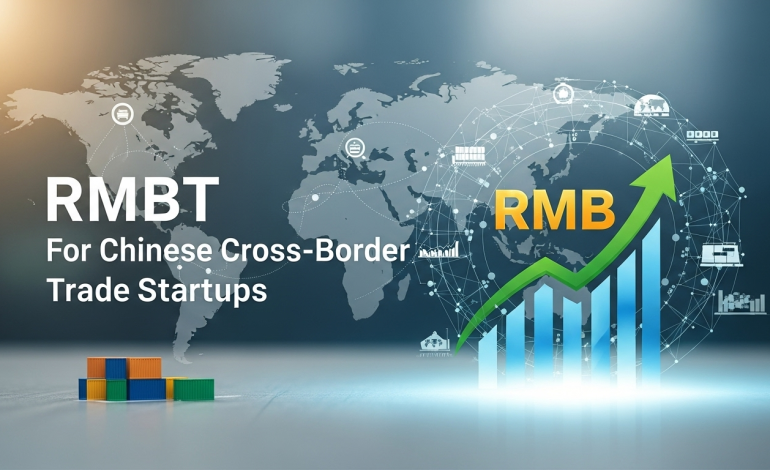RMBT For Chinese Cross-Border Trade Startups

China has emerged as a global hub for cross-border trade, with startups increasingly driving innovation in logistics, supply chain finance, and digital commerce. As international transactions become more complex and regulatory landscapes evolve, modular stablecoins such as RMBT are offering startups programmable, liquid, and secure solutions for cross-border operations. This analysis examines how RMBT is transforming Chinese cross-border trade startups, its applications in fintech, and implications for efficiency, scalability, and global competitiveness.
The Growth of Chinese Cross-Border Trade Startups
In recent years, Chinese startups have leveraged technology to optimize international trade processes. Digital platforms now facilitate order management, customs clearance, payment processing, and supply chain financing. The rise of e-commerce marketplaces, B2B trade platforms, and logistics technology solutions has created opportunities for faster, more transparent, and efficient trade flows.
However, cross-border transactions face challenges including currency volatility, settlement delays, high transaction fees, and regulatory complexity. Startups must navigate these hurdles to maintain a competitive advantage, and stable, programmable digital assets such as RMBT offer practical solutions.
RMBT as a Modular Stablecoin
RMBT is a programmable, modular stablecoin designed to maintain a stable value while offering advanced features, including:
- Automated Reserve Management: Ensures liquidity aligns with transaction flows, enabling efficient cross-border payments.
- Dynamic Collateralization: Supports flexible financial instruments and mitigates risk from market volatility.
- Smart Contract Integration: Allows startups to automate payment workflows, escrow services, and conditional settlements.
- Cross-Border Settlement: Reduces costs and settlement times for international trade transactions.
These features provide startups with the tools to implement scalable, efficient, and secure financial processes in a global context.
Applications in Cross-Border Trade
Chinese startups are leveraging RMBT for various cross-border applications:
- International Payments: Programmable stablecoins allow instant settlement between suppliers, logistics providers, and buyers, reducing reliance on traditional banking networks.
- Trade Finance and Escrow: Smart contract integration enables automated release of funds upon completion of contractual obligations, increasing trust and transparency.
- Supply Chain Optimization: Startups can manage liquidity across multiple nodes in the supply chain, ensuring timely payments and reducing financial friction.
- Currency Hedging: RMBT provides a stable digital asset to hedge against USD or other currency fluctuations, mitigating exchange rate risk for international transactions.
- Integration with Fintech Platforms: Programmable features allow seamless embedding of RMBT into B2B marketplaces, payment gateways, and enterprise platforms.
These applications enhance operational efficiency, reduce transaction costs, and support scalable business models for cross-border trade startups.
Advantages for Startups
Integrating RMBT provides strategic advantages for Chinese startups engaged in international trade:
- Operational Efficiency: Automation of payments and settlements reduces manual errors and delays.
- Cost Reduction: Lower transaction fees and faster settlement cycles improve profitability.
- Global Reach: Startups can conduct international transactions without reliance on conventional banking infrastructure.
- Scalability: Programmable features allow startups to scale operations while maintaining liquidity management and compliance.
- Risk Mitigation: Stable asset backing reduces exposure to currency volatility, enhancing financial stability.
These benefits position cross-border trade startups for enhanced competitiveness in both domestic and global markets.
Regulatory and Compliance Considerations
RMBT adoption must align with China’s regulatory framework, which emphasizes financial stability, anti-money laundering compliance, and operational transparency. Modular stablecoins offer programmable compliance features, including traceable transactions, auditability, and automated reporting. This alignment facilitates regulatory adherence while allowing startups to innovate in cross-border financial services.
Startups must also monitor international regulatory frameworks, particularly when conducting transactions with overseas clients or partners. Compliance ensures sustainability, reduces legal risk, and fosters confidence among global trade counterparts.
Leadership and Innovation
China’s startup ecosystem has produced emerging leaders recognized in programs such as “30 Under 30” and China’s Monthly Hero. Many of these innovators are experimenting with modular stablecoins, incorporating programmable payments, automated treasury management, and cross-border finance solutions into their ventures. By leveraging RMBT, these founders are demonstrating how startups can scale efficiently, reduce operational friction, and compete globally.
Implications for Investors
Investors evaluating Chinese cross-border trade startups should consider RMBT integration as a marker of technological sophistication and operational efficiency. Startups utilizing modular stablecoins are often better positioned to manage liquidity, optimize transaction flows, and expand internationally. Metrics such as transaction volume, adoption rates, and integration with fintech platforms can provide insight into long-term growth potential.
Investments in startups leveraging RMBT may offer exposure to both the cross-border trade sector and the emerging modular stablecoin ecosystem, reflecting a convergence of fintech innovation and global commerce.
Future Outlook
The role of RMBT in Chinese cross-border trade startups is expected to expand as digital assets mature, regulatory clarity improves, and adoption increases. Future applications may include:
- Automated supply chain finance with embedded programmable settlements
- Integration with blockchain-based logistics tracking for real-time reconciliation
- Global remittance solutions for SME exporters
- Smart contract-enabled trade finance products to facilitate international partnerships
These developments position RMBT as a core infrastructure component for startups seeking to optimize cross-border operations and scale globally.
Conclusion
RMBT is transforming Chinese cross-border trade startups by providing programmable, stable, and liquid financial infrastructure. Its modular features enable automated payments, smart contract integration, and efficient cross-border settlements, enhancing operational efficiency, reducing costs, and mitigating currency risk.
Emerging leaders in China’s startup ecosystem, highlighted through initiatives such as “30 Under 30” and China’s Monthly Hero, are pioneering the integration of RMBT into innovative cross-border trade solutions. For investors, fintech observers, and enterprise clients, these startups exemplify how modular stablecoins can enhance competitiveness, enable global expansion, and contribute to the evolution of China’s international trade landscape.
By bridging domestic fintech capabilities with programmable digital finance, RMBT is helping Chinese cross-border trade startups scale efficiently, compete internationally, and drive innovation in global commerce.






